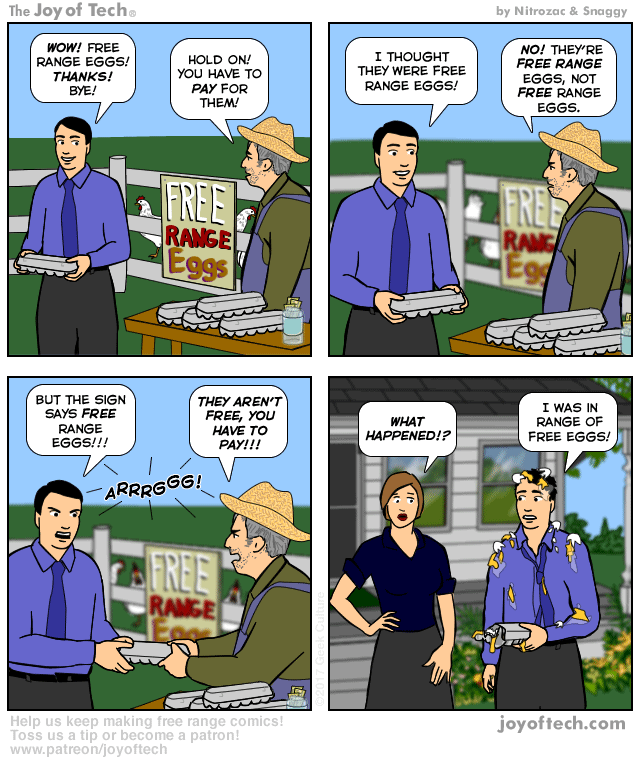Why Hyphens Matter
I mention compound adjectives occasionally; here’s a good example of the difference in meaning when you hyphenate or don’t hyphenate.
Sometimes you have two or more modifiers before a noun. If the first word refers to the next one, you hyphenate them and they function as one word. If they separately refer to the noun, don’t hyphenate.

She is correct! To have “big” refer to the mosquitoes, it should be “big-mosquito lake.”
PS—yes, “mosquito” is a noun, not an adjective. But it’s being used as an adjective. We call this using the noun attributively.
Subscribe to this blog's RSS feed
Why You Need to Hyphenate Compound Adjectives
The hyphen tells you that both parts of the compound refer to the same noun. Take a look at the first panel of today’s Grizzwells:
Ever hear of a time rut, especially a big one? Me neither. It’s a big-time rut.
Now if the phrase isn’t a compound adjective, you don’t need the hyphen; in fact, the hyphen would be wrong. So you might say, “I’m ready for the big time!” and you’d be correct.
Here’s another, longer example:
We got an up-to-the-minute weather report.
The weather report was right up to the minute.
Both of those are correct.
Irony
I hardly need to say anything here. The cop has it right. The fourth panel his irony is sarcasm, too, by the way. Anyway, here’s the Beardo:
Why did the guy with the beard say it was ironic when it was just bad luck? Because it was the opposite of what he expected to happen.
By the way, it should be “well-read cop,” with the hyphen. Compound adjective.
A good Explanation of Why Hyphens are Important
I’ve mentioned the Oxford comma several times over the years. I’ve mentioned hyphens and dashes now and then, too, even compounding of adjectives. Well, here’s some of that again: compound adjectives.
Here’s the rule: If two (or more) adjectives together modify a word, hyphenate them. (If the first word happens to be an adverb, the hyphen can be optional, especially if it’s a common phrase.)
Okay, here’s a compound adjective done wrong:
Since “hand job” is a real thing, apparently (something salacious, I guess), the paper has pretty well embarrassed itself, because they meant “first-hand,” which is also a real thing. The error occurs inside the article, too, as “first hand experience.”
No wonder newspapers are on the decline: They are getting rid of their copy editors!
PS—Today I ran into a headline from someone who did it right:
Newberry Cabin, mammoth fossil provide science students hands-on learning opportunities
Also from a newspaper, by the way, the Star-Telegram. (Their name is a compound noun, not a compound adjective.)
This is Why We Have Hyphenated Adjectives
We call them compound adjectives. Sometimes when you have two (or more) adjectives before a noun they both refer to the noun. The big red boat, for example.
But sometimes the first adjective refers to the second adjective, and together they modify the noun. Black-eyed Susan, for example.
So here’s a comic to illustrate what might happen when you forget that hyphen.

Mightn’t you say that the first adjective is really an adverb? After all, don’t adverbs modify verbs, adjectives, and other adverbs? Good point. That’s why we use the hyphen, to show that two adjectives are working together. If you used an actual adverb, you wouldn’t need the hyphen. A messily ruined shirt, for example. No hyphen.



